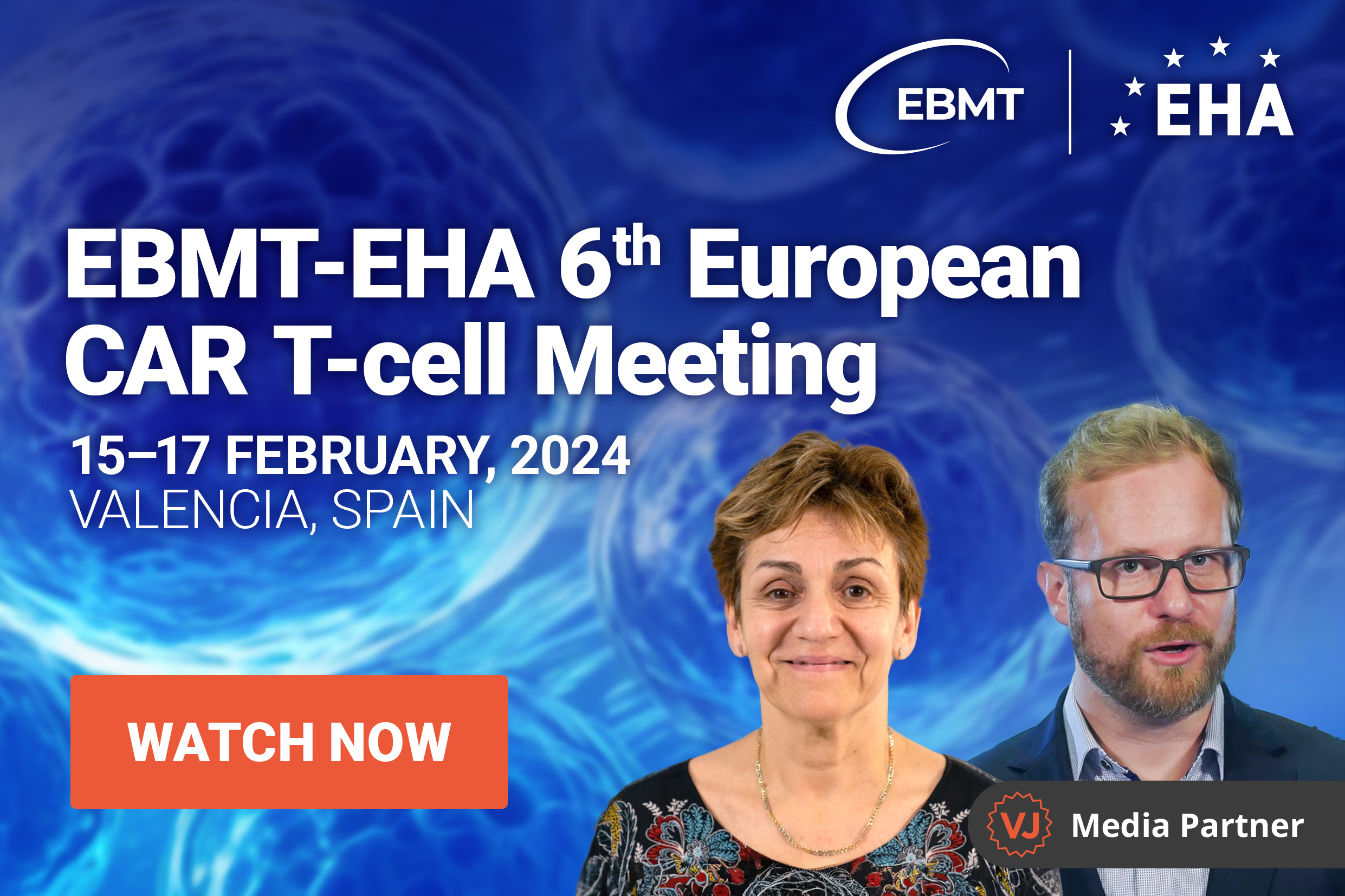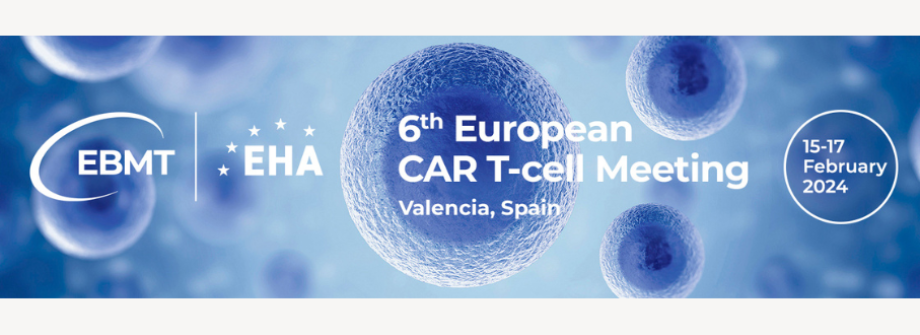
The 6th edition of the EBMT-EHA European CAR T-cell Meeting took place from the 15th to the 17th of February 2024 in Valencia, Spain and online. It was attended by 1022 delegates onsite and 181 attendees followed the meeting online. Once again, the meeting was a great opportunity to meet in person for practice sharing and real networking.
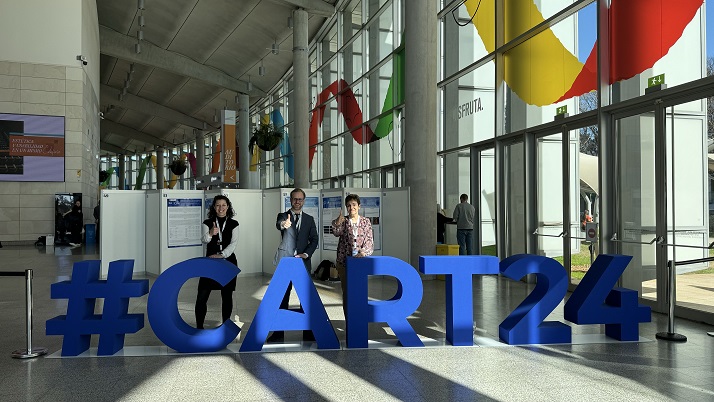
Below, you can read the summaries of the sessions.
Thursday February 15, 2024
The EBMT-EHA 6th European CAR T-cell Meeting kicked off with an inspiring opening address from Chairs Dr. Anna Sureda and Dr. Michael Hudecek, setting the tone for the event. They emphasised the strong attendance, reflecting widespread interest and engagement in CAR T-cell therapy. Additionally, they highlighted the record number of abstract submissions, indicative of the increasing significance and relevance of this field in contemporary medical research. These remarks set the stage for a conference that began with formidable momentum, carrying through to deliver groundbreaking insights and discussions across its sessions.
Summary by Alex Rampotas, University College London, Cancer Institute, UK
In his keynote lecture, Prof. Carl June, shared ground-breaking pre-clinical data on the future of CAR T-cell therapies. His presentation elucidated how 'armoring' CAR T-cells through the modulation of immunosuppressive elements, such as CTLA-4, could significantly augment their efficacy. Moreover, the potential for these engineered cells to enhance solid tumour clearance as neo-adjuvant therapy, particularly by targeting the tumour microenvironment, was a highlight of his talk.
Subsequent sessions delved into the nuances of managing acute lymphoblastic leukaemia (ALL) in the pre-CAR T-cell therapy phase, with further updates on the therapy's application in ALL cases. Notably, the use of non-viral Sleeping Beauty-engineered Dual CAR-CIK cells in acute myeloid leukaemia (AML) treatment was discussed, alongside the mechanisms of response and resistance in CAR T-cell applications for leukaemia and lymphoma. The session wrapped up with a stimulating Q&A segment, cantering on the pivotal question of whether CAR T-cell therapy will be the turning point in the battle against myeloid leukaemia.
The conference then transitioned to exploring new horizons with 'New Frontiers for CAR T Cells', particularly focusing on the advancements in genome editing using CRISPR technology. One of the most captivating presentations came from Corina Amor, who unveiled pre-clinical findings demonstrating how CAR T-cells targeting senescence markers could potentially reverse aging. Her data on improved surrogates of aging in mice offered a tantalizing peek into the versatile future of CAR T-cell applications.
In his second keynote lecture, Michael Sadelain captivated the audience with insights into enhancing the persistence of CAR T-cells. His 'tour de force' presentation covered a breadth of projects under his stewardship, showcasing promising outcomes and innovations in the field.
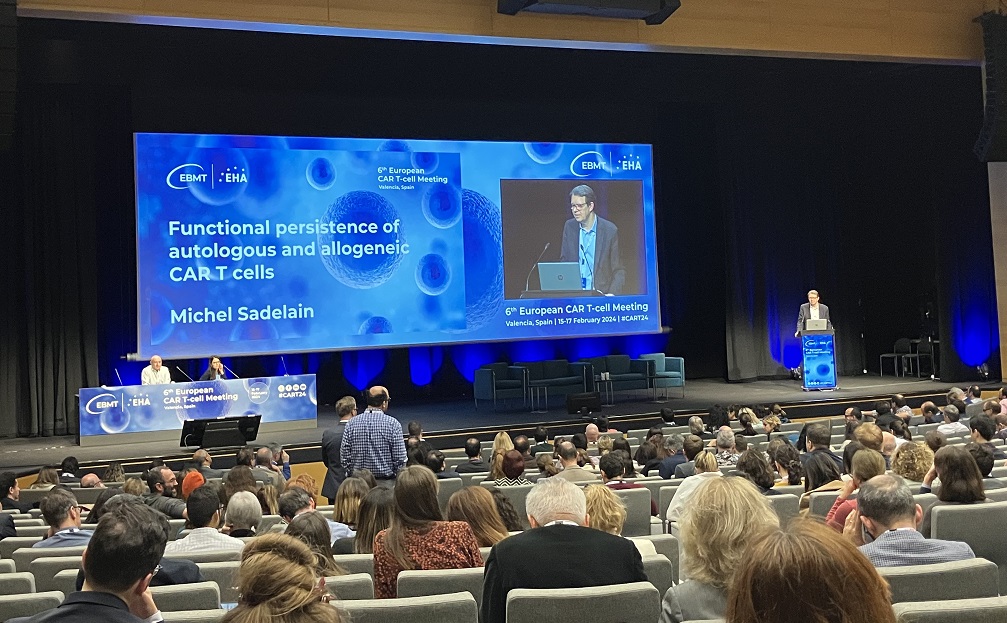
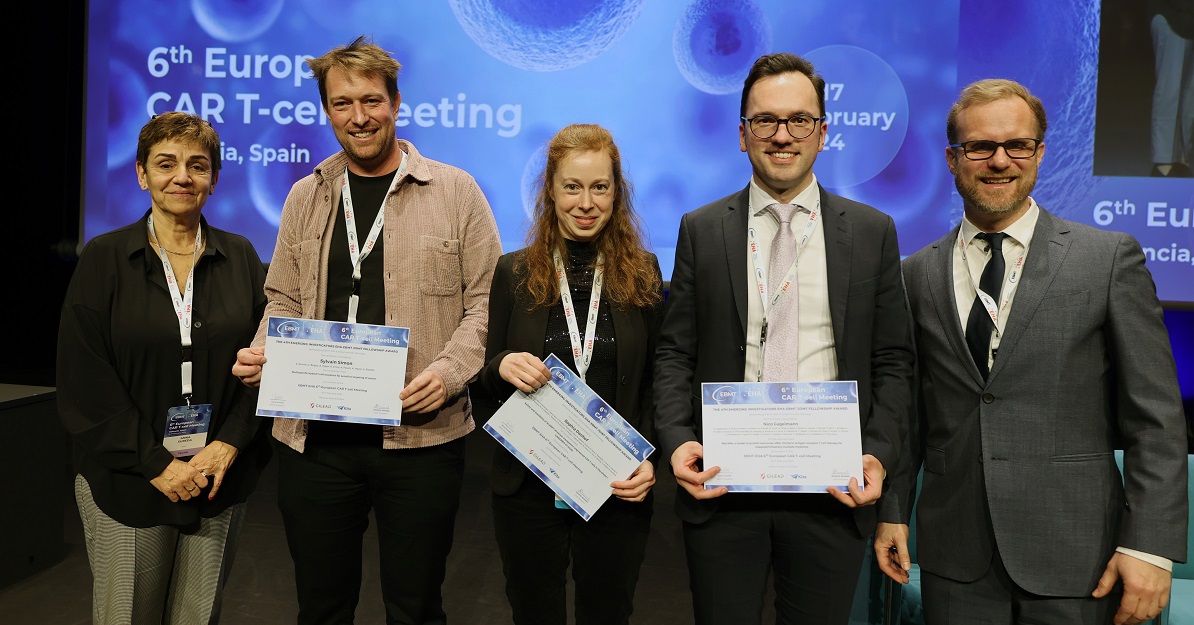
From left to right: A. Sureda (Meeting Chair, EBMT); Sylvain Simon (Seattle, United States); Sophia Danhof (Würzburg, Germany); Nico Gagelmann (Hamburg, Germany); M. Hudecek (Meeting Chair, EHA)
The day culminated in an engaging poster tour, where a selection of impressive posters were presented, each contributing to the evolving landscape of CAR T-cell research.
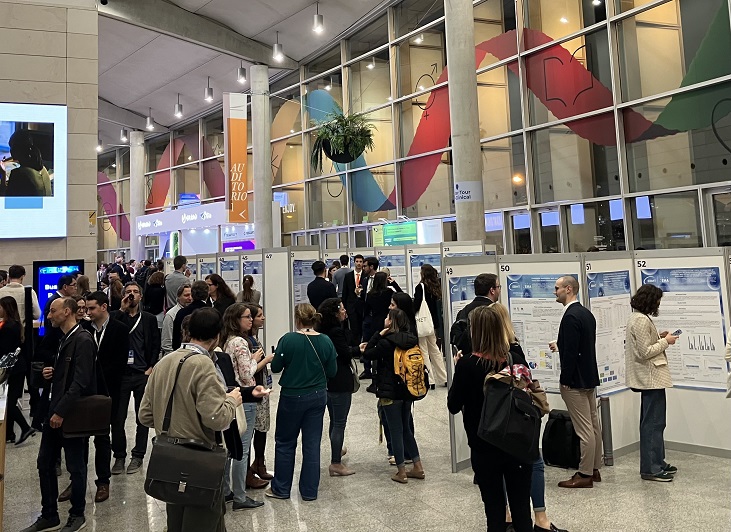
Friday February 16, 2024
Summary by Eleni Gavriilaki, Aristotle University of Thessaloniki, Greece
The second day of this exciting meeting started on Friday 16 February, with two parallel sessions. While attendees were rushing into Auditorium 1, three interesting clinical cases were unraveled. The Clinical case discussions were coordinated by representatives of the EBMT Trainee Committee and YoungEHA Committee in order to highlight efforts of early career researchers and physicians in this field. Cases were selected based on scoring after peer-review, focusing on three different CART indications: B-acute lymphoblastic leukemia, high grade lymphomas and multiple myelomas. In parallel, cases reflected three different hot topics that CART physicians are facing: hemophagocytic lymphohistiocytosis (HLH)/ macrophage activation syndrome (MAS), neurotoxicity, and administration of new products. Questions from the panelists, chairs, and the audience created a fruitful discussion.
At the same time, Auditorium 2 hosted an innovative discussion on CAR designs, with three compelling presentations on: antigen sensitivity and fidelity of activation in CART cells, epitope editing for Acute Myeloid Leukemia (AML), and “fine”-tuning Tuning CAR affinity and CART cell reactivity. Paving the way into the future of CART cell therapy, speakers and chairs drew the attention of the audience into these translational perspectives. A few minutes later, the nurses programme began with a warm welcome on behalf of EHA and EBMT, as well as two meaningful keynote lectures on access and restrictions not only in low resource settings, but also in Europe.
After warm conversations and plenty of networking opportunities during the coffee break, the physician’s programme continued with a very pragmatic clinical session focusing on lymphomas. Issues discussed included the role of transplantation, bridging therapy, lymphodepletion, and the real-world experience. In parallel, current update on manufacturing and regulatory aspects were discussed, including the role of academic developers, hospital exemptions for advanced therapy medicinal products (ATMPS), cost-effectiveness, and centralised versus point-of care manufacturing. In the nurses section, four interesting lectures highlighted current problems that healthcare professionals face in the CART reality. All sessions concluded with active participation of the audience in interesting discussions.

Dr. Stanley Riddell presented a keynote lecture entitled "Overcoming the hurdles to effective T cell therapy for multiple myeloma." Dr. Riddell's research team investigates the differentiation states of human T cells in various health conditions, focusing on gene transfer and editing techniques to engineer T cells with chimeric antigen receptors (CARs) and T cell receptors (TCRs) targeting tumor antigens.
Summary by Edoardo Campodonico, IRCCS Ospedale San Raffaele, Milan, Italy
This CAR T-cell Meeting also marked the official start of the “autoimmune disease session” focusing on CAR T-cell indications for rheumatologic and neurological disorders. Dr. Raffaella Greco provided an excellent overview on the “state of the art” concerning transplant and cell therapies in the context based on EBMT’s Autoimmune Diseases Working Party (ADWP) cooperative effort. Dr. Mackensen reported the strikingly outstanding results of CD19CARs in systemic lupus erythematosus, which will most likely pave the way to multiple randomized high-quality trial for such products in systemic connective tissue diseases. Dr. Howard brought us into the neurology realm detailing a trial of RNA-based CAR T-cells for treatment of advance myasthenia gravis, thus lighting a beacon of hope also for organ-specific autoimmune disorders. To conclude, Dr. Doglio went “back to the bench” and focused on his research aimed at developing CAR T-regulatory cells as a potential tool to harness the immune-system in order to restore tolerance against oneself. As Dr. Snowden playfully remarked, it took a while for autoimmune disorders to be promoted to the “Premier League” of cellular therapy but, once it has happened, it is quite likely that autoimmunity is here to stay.
After a refreshing symposium led by distinguished clinicians discussing how to improve survival outcomes and patient management and accelerate CAR manufacturing.
The rest of the afternoon was dedicated to the best abstracts submitted for oral presentations. This session spanned on a wide variety of pre-clinical projects and clinical trials, offering a thorough overview of some of the most exciting advances in the field. Some highlights included insights on the role of microglial cells in the development of CAR-mediated neurotoxicity, combinatorial strategies with small molecule inhibitors to enhance CAR T-cell efficacy in solid malignancies, as well as clinical updates on long-term follow-up of the first R/R follicular lymphoma patients treated with CD19CARs and a quick overview on how to sequence cellular and immunotherapy in multi-refractory multiple myeloma.
PS07 Patient forum: Changing evidence needs in CAR-T.
Summary by Natacha Bolaños, Chair of the EBMT Patient Advocacy Committee, Madrid, Spain
Chairs: Jana Pelouchova (Prague, Czech Republic) & Marie José Kersten (Amsterdam, Netherlands)
As CAR-T is a novel therapeutic option, insufficient tools exist for monitoring and understanding the effects of the treatment on patients’ quality of life (QoL) and translate these in data valid to inform decision-making especially for regulatory, HTA, and pricing. Several projects are underway to capture the patient experience, and to develop and validate questionnaires and tools that will allow this data to be appropriately integrated for decision-making.
Composed by short presentations, the patient forum provided with different stakeholders' viewpoints on what evidence could best contribute to better define the value proposition of the CAR-T cell therapies, and what uncertainties remain. Lorna Warwick provided the patient perspective, followed by Maria Jose Kersten who remarked the wide variation in the measurement of QoL in CAR-T pathway, as confirmed in a literature review, and introduced the EORTC development of a validated PRO tool for CAR-T. Carmen Sanges explained the roadblocks and challenges as perceived by the T2EVOLVE multistakeholder consortium and hypothesised on potential approaches and solutions. Dalia Dawoud outlined the missed evidence for HTA and reimbursement decision making, and the challenges HTA bodies face to define the value of the CAR-T cell therapy and what evidence may help to fill in the gaps. Julio Delgado presented an overview of hospital exemption work, and the learnings from being able to run your own "In-house" manufacturing of CAR-T cell therapy under the hospital exemption scheme, rather than using a market a product. The presentations were followed by a dynamic discussion about the pathways to integrate patient experience data to fully determine the value of the novel therapies.
Nurses Sessions
Summary by Michelle Kenyon, Thomas Jézéquel and Mairéad NíChonghaile from the Nurses Group
Welcome and keynote lectures
Following a short welcome address from Michelle Kenyon, EBMT Nurses Group President and Erik Aerts, President HNHCP, the nurse programme launched with the Keynote lectures. Firstly, an incredibly thought provoking and inspiring presentation from Candice Hendricks (SA), focusing on CAR-T cell therapy in low resource settings – opportunity, inequality or both. From there, we continued along the theme of treatment access with a superb round up of The European Story - access and restrictions from Stefanie Kreutmair (CH). Both lectures highlighted that we are still a long way from CAR-T cell therapy reaching those patients that are eligible and in need.
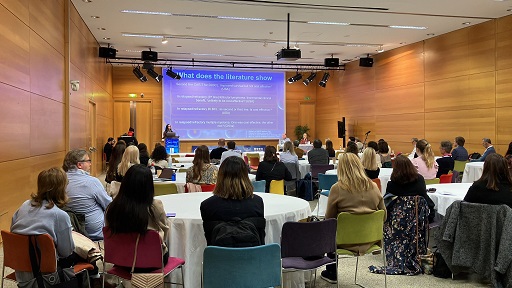
Before and during - The next session dealt with the before and during of CAR-T treatment and started with a presentation by Prof Antonia Muller from Vienna presenting a framework for getting centers ready for CAR-T treatments highlighting the immense workload required with the onboarding of each product, the multidisciplinary team aspect of the process and the need for standardised qualification process for centres. Dr Japp van Doessum working in Groningen followed with a disease update and where the treatment fits, highlighting the accessibility issues faced.
The session then moved on with two presentations discussing the management of CAR-T toxicities, with Ruth Clout from Manchester telling us about the prophylactic management of the associated toxicities and Dr Audrey grain from Nantes presenting case studies of unusual presentations of CAR-T toxicities. Both speakers highlighted the need for prophylaxis where possible and also the identification of toxicities. The EHA/EBMT consensus grading and best practice recommendations for Immune effector cell-associated hematotoxicity were mentioned as a valuable resource.
Ethical considerations for challenging cases surrounding advanced therapies – case presentations and panel discussion
Chairs: Julia Ruiz Pato, Thomas Jézéquel
Speakers: Martina Spalt, Dr Victoria Metexa
The afternoon began with an overview of ethical considerations in the light of the new therapeutic perspectives offered by CAR-T therapies. Martina Spalt and Dr Victoria Metexa shared their experiences and presented three clinical cases that raised a number of ethical issues, which we shared with the audience in two panel discussions.
A number of issues were raised, such as patient involvement in care plans, shared medical decision-making between the team and the patient, and access to advance directives when the patient is no longer able to give an informed opinion.
During our discussions, we also raised issues such as the inter-professional barriers that arise in these ethical considerations and the levers that allow us to focus on care rather than cure in palliative situations.
Finally, we discussed the concept of advocacy used by professionals in the multidisciplinary team, particularly nurses, whose aim is to promote the interests of patients in these medical situations where the boundary between care plans, therapeutic progress and unreasonable obstinacy can sometimes be difficult to perceive.
Oral abstract session – Flash talks - For the first time, the selected oral abstracts were presented as Flash talks. With every speaker allotted 4 minutes followed by 2 minutes discussion, we were able to showcase a number of different projects; Nurse led Late Effects Clinic for CAR-T cell Clinical Trials (Leigh Wood, UK), Pilot Study about the Workload in CAR-T Patients and Carers (Mei Fernandez Crespo, ES), Nurse Role in the Collection of CAR-T cells (Catia Romeiro, PT) and Cognitive Impacts and Neurotoxicity in CAR-T Cell Therapy (Evlampia Strongyli, GR). Well done to all those that presented.
Aftercare - Moving back to the educational sessions again and focusing on the aftercare of those receiving CAR-T cell therapy, we began with Prevention and management of long-term infections. Marjola Giergi (IT) gave a fantastic overview of late infectious complications with some key take home messages about the importance of the nurses role. Thorsten Schmidt (DE) followed by walking us through the importance of Physical activity and Cancer. Two outcome critical topics where nurses have a significant role in supporting patients on their journey back to well-being.
Changing emphasis, we then welcomed Daniel Sarnito (ES) and his partner Marina Cornado Iniesta (ES) together with Nieves Cuenca (ES). We were privileged to hear Daniel share his experience as a CAR-T cell recipient, accompanied by Marina offering her perspectives as a carer. Their incredibly poignant and remarkable story was generously shared and was packed with cues, ideas, tips and recommendations for those in the audience to learn from. Nieves, and the charity that she represents, Fundacion Leucemia Y Linfoma, had an important role in Daniel and Marina’s story and we were fortunate to hear the range of services and support available from the charity for patients in Spain. This session was one of the programme highlights.
What’s next? - The final session of the programme began with Annalisa Ruggeri (IT), outlining the next steps with CD19 CAR-T – beyond and after where we heard a taster of the upcoming trials, indications and products. With new indications on the horizon and increase numbers of patients elligible for treatment, there is undoubtedly concern in the community about treatment accessibility and provision and so it seemed very apt to end with Christian Chabannon (FR) sharing his work and insights focused on Future proofing and capacity building.
Sincere thank you to all our speakers, chairs and attendees.
Saturday February 17, 2024
Summary by Edoardo Campodonico, IRCCS Ospedale San Raffaele, Milan, Italy
The EBMT-EHA 6th European CAR T-cell Meeting wrapped up on Saturday boasting a tight schedule crowded with notable speakers, truly earning for itself the title of “world’s leading cell therapy meeting”, as Michael Hudecek rightfully dubbed it.
The day kicked off with an intriguing overview on multiple myeloma chaired by Marìa-Victoria Mateos and Paola Neri. This session managed to strike an ideal balance between clinical updates and basic research thanks to the speakers’ invaluable contributions. First, dr. Hermann Einsele reviewed current treatment indications for anti-BCMA CAR T-cells and ongoing trials aimed at comparing them against the standard-of-care in earlier lines of treatment. Moving on, dr. Paola Neri detailed how relevant a mechanism antigen loss is for CAR T-cell failure in MM, offering precious biological insights that might help clinicians deciding how to properly sequence immunotherapies and how to act in case of failure. To conclude, Dr. Martinez-Climent and Dr. Maria Themeli gave us a glimpse at the future by detailing how they design animal models that recapitulate multiple myeloma and how they derive CAR T-cells from iPSCs, respectively. Despite all due caveats related to costs and access, the outlook on multiple myeloma has never been brighter and uttering the word “cure” does not sound like a heresy anymore.
The following session, moderated by Dr. Vanderson Rocha and Dr. Nina Worel, focused on what is arguably the most compelling real-life issue in CAR T-cell therapy: how to expand coverage, grant widespread accessibility and offer an equitable treatment to all hematological patients’ regardless of race, income, and country of origin. A panel of distinguished speakers from all over the world reported a handful of virtuous experiences aimed at broadening availability. Alejandro Madrigal presented the soon-to-be first CAR T-cell center in Central America; Abraham Avigdor presented the excellent results of locally-produced academic CD19 CAR T-cells in Israel; He Huang detailed the immensely complex landscape of ongoing CAR T-cell protocols in China and Francesca Lim updated us on the current regulatory status of commercial CAR T-cells in Singapore. This session provided a plethora of thought-provoking cues on how to overcome barriers related to costs and overthrow the obstacles that hamper universal access to CAR T-cells. Multiple potential solutions are available, including international cooperation, academic-driven research and cost negotiation: hence, raising awareness is pivotal to implement all of them in a synergistic way.
In the last keynote lecture of the meeting, Dr. Fabio Ciceri summarized the latest achievements in Chiara Bonini’s laboratory in Milan, revolving around TCR reprogramming as a tool to fight multiple malignancies. In addition, Dr. Ciceri illustrated some Italian cooperative initiatives aimed at identifying adequate tumor-associated antigens for solid malignancies and subsequently devising cellular products to test against them both in vitro and in vivo.
Finally, Dr. Sonia Guedan and Dr. Andreas Mackensen guided us through what regularly represents the “avant-garde” session of the meeting, concerning solid malignancies. This panel boasted a series of talks from renowned speakers providing updates about what lies at the forefront of cellular therapy in oncology. Dr. Majzner and Dr. Chen reviewed some of their brand-new strategies to overcome the essential roadblocks hampering CAR-T cell effectiveness in solid tumors. Some highlights of their talks included “AND”-logic gating to curb on-target off-tumor toxicity, bi-specific CARs harnessing soluble TGF-beta to convert its inhibitory effect into a co-stimulatory one, loco-regional CAR delivery to treat glioblastoma, and much more. Afterwards, dr. Quintarelli spread some long-waited optimism by reporting outstanding results with anti-GD2 CAR T-cells in children affected by neuroblastoma in a trial which might pave the way towards commercial availability of anti-GD2 CAR T-cells. In conclusion, Michael Hudecek proposed some potential applications for anti-ROR1 and ROR2 CAR T-cells, including adrenocortical carcinoma.
To summarise, although the road ahead is still tortuous and scattered with protean challenges, a cautious optimism is warranted in that significant progress has been achieved both on the bench and at the bedside. The everlasting quest to defeat tumors is far from over, but immunotherapy will keep on tearing cancer apart one small step at a time.
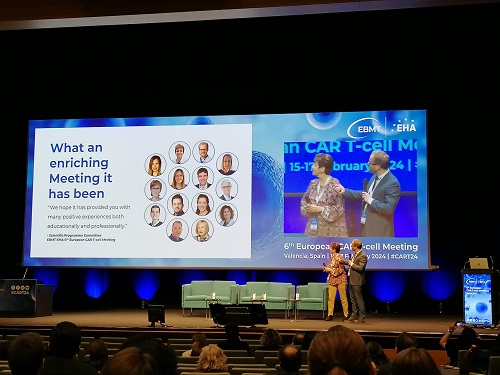
Dr. Michael Hudecek concluded the conference with a compelling discussion on the transformative potential of anti-ROR1 and ROR2 CAR T-cells in various medical contexts. His insights shed light on the promising applications of these novel CAR-T cell therapies by emphasizing their preclinical and clinical development for tackling the complexities of multiple myeloma and clear cell renal cell carcinoma. This collaborative effort, in partnership with Fraunhofer IZI, will enter the clinical phase shortly.
As Dr. Anna Sureda and Dr. Hudecek delivered their closing remarks, there was a palpable sense of shared commitment among attendees to drive forward innovative therapies, ultimately aiming to enhance patient outcomes and reshape the landscape of medical care.
Watch the Expert Interviews
